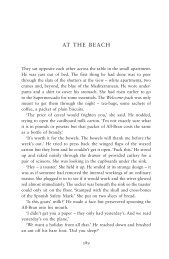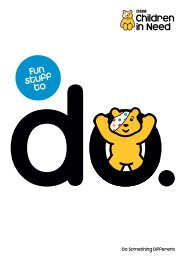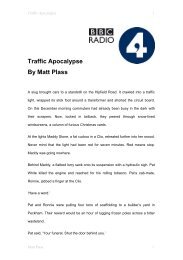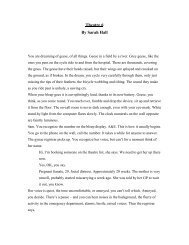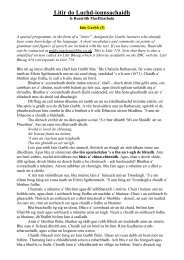You also want an ePaper? Increase the reach of your titles
YUMPU automatically turns print PDFs into web optimized ePapers that Google loves.
<strong>The</strong> <strong>Flatmates</strong><br />
Episode 68:<br />
Is the Cat Ill?<br />
Teacher’s <strong>pack</strong><br />
Lesson plan and student worksheets<br />
with answers
<strong>BBC</strong> Learning English – <strong>The</strong> <strong>Flatmates</strong><br />
Episode 68<br />
CONTENTS<br />
1. Level, topic, language, aims, materials, preparation<br />
2. Teachers notes: Lesson stages<br />
3. Answers<br />
4. Student worksheet<br />
Level: Intermediate and above<br />
Language: Dialogue; Idioms with 'up' and 'down'<br />
Aims: Listening skills – Understanding a short dialogue<br />
Language skills – Text reconstruction<br />
Idioms with 'up' and 'down'<br />
Lesson length: Approximately 90 minutes<br />
Materials: Lesson stages<br />
Student worksheet<br />
<strong>The</strong> <strong>Flatmates</strong> episode 68: Available online at:<br />
http://www.bbc.co.uk/worldservice/learningenglish/flatmates/episode68/index.shtml<br />
Preparation: Before the lesson:<br />
• Make enough copies of the student worksheet so that there is one for<br />
every student.<br />
• (Optional) make enough extra copies of the jumbled dialogue (student<br />
worksheet task 1) so that there is one copy per pair / small group of<br />
students. Cut the dialogues into strips to make the re-ordering task easier.<br />
• (Optional) make enough extra copies of the idioms and meaning matching<br />
activity (student worksheet task 3) so that there is one copy per pair / small<br />
group of students. Cut the idioms and definitions into strips to make the<br />
matching task easier.<br />
• Make sure you have available the audio for <strong>The</strong> <strong>Flatmates</strong> episode 68.<br />
© <strong>BBC</strong> Learning English<br />
bbclearningenglish.com<br />
Page 2 of 11
<strong>BBC</strong> Learning English – <strong>The</strong> <strong>Flatmates</strong><br />
Episode 68<br />
TEACHERS NOTES: LESSON STAGES<br />
A Stimulate student interest<br />
Generate interest by showing them the image from episode 68 (below, and available at:<br />
http://www.bbc.co.uk/worldservice/learningenglish/flatmates/episode68/index_blank.shtml)<br />
Make sure you use the 'hide the text' feature and scroll up so that students can not read the<br />
dialogue or see the vote.<br />
Ask students:<br />
• Who are these people? (Tim, Alice and Helen, and Kitty the cat).<br />
• Where are they? (in the living room of the flat)<br />
• Look at Helen's face. How is she feeling? (sad / unhappy / depressed)<br />
• Why does she feel that way? (elicit some possible reasons but do not confirm or deny<br />
anything at this stage)<br />
B Pre-teach essential vocabulary<br />
Write the words on the board, eliciting spelling as you write. Make sure students copy the<br />
boardwork into their notebooks. Model and drill the correct pronunciation of the words: elicit and<br />
show the word stress of each item and word class, if appropriate.<br />
blimey<br />
an expression of surprise or annoyance, used mainly in British English<br />
a bloke<br />
an informal term for 'a man'<br />
C Pre-listening: prediction<br />
Give out the student worksheet (or cut-up dialogues if you have prepared any). Students work in<br />
pairs or small groups to order the dialogue.<br />
D Listening (episode 68)<br />
Tell students they are going to listen and check their answers. Play the audio (without showing the<br />
text): available at:<br />
http://www.bbc.co.uk/worldservice/learningenglish/flatmates/episode68/index_blank.shtml<br />
Play a second time if necessary; check answers as a class. Have students act out the dialogue in<br />
groups of 3.<br />
© <strong>BBC</strong> Learning English<br />
bbclearningenglish.com<br />
Page 3 of 11
<strong>BBC</strong> Learning English – <strong>The</strong> <strong>Flatmates</strong><br />
Episode 68<br />
E Language focus<br />
Ask students to look again at the dialogue and underline all the expressions with 'up and down'.<br />
Ask them if they know any more.<br />
F Language focus<br />
Students match the idioms with 'up' with their definitions (task 2 on the student worksheet; or give<br />
them cut up versions if you can. Students can check their answers by looking at the next page of<br />
their worksheets (also available at<br />
http://www.bbc.co.uk/worldservice/learningenglish/flatmates/episode68/languagepoint.shtml)..<br />
Feedback as a class and drill the idioms.<br />
KEY: 1-F 2-D 3-G 4-A 5-E 6-I/B 7-I/B 8-K 9-C 10-H 11-J<br />
G Practice<br />
Students do task 3 on their worksheets (also available at<br />
http://www.bbc.co.uk/worldservice/learningenglish/flatmates/episode68/quiz.shtml). Feed back as a<br />
class.<br />
H Further practice<br />
Students complete the follow-up dialogue (task 4), using as many 'up' and 'down' idioms as<br />
possible. <strong>The</strong>y then act out their dialogues for the rest of the class, who can count the number of<br />
idioms in each dialogue while they listen.<br />
© <strong>BBC</strong> Learning English<br />
bbclearningenglish.com<br />
Page 4 of 11
<strong>BBC</strong> Learning English – <strong>The</strong> <strong>Flatmates</strong><br />
Episode 68<br />
ANSWER KEY<br />
Task 1<br />
11 Alice: Tim! You’re such a bloke, aren’t you!<br />
2 Alice: <strong>The</strong> cat? Seems fine to me. Why?<br />
4 Alice: She’s fine.<br />
6 Tim: I’m sorry Helen. I’m up to my ears in work at the moment. Anyway,<br />
© <strong>BBC</strong> Learning English<br />
she seems fine, aren't you Kitty?<br />
3 Helen: I think we should take her to the vet. She doesn’t seem right to<br />
me.<br />
9 Alice: Oh, she’s just a bit down in the dumps at the moment.<br />
5 Helen: No, she’s not! You guys never listen to me. Tim, can you take her<br />
to the vet?<br />
10 Tim: Right. Why’s that?<br />
1 Helen: Hey guys, do you think the cat’s okay?<br />
8 Tim: Blimey, what’s up with her?<br />
7 Helen: I told you she’s not well! Right, if you lot don’t care, I'll take her!<br />
Re-ordered version<br />
1 Helen: Hey guys, do you think the cat’s okay?<br />
2 Alice: <strong>The</strong> cat? Seems fine to me. Why?<br />
3 Helen: I think we should take her to the vet. She doesn’t seem right to<br />
me.<br />
4 Alice: She’s fine.<br />
5 Helen: No, she’s not! You guys never listen to me. Tim, can you take her<br />
to the vet?<br />
6 Tim: I’m sorry Helen. I’m up to my ears in work at the moment. Anyway,<br />
she seems fine, aren't you Kitty?<br />
7 Helen: I told you she’s not well! Right, if you lot don’t care, I'll take her!<br />
8 Tim: Blimey, what’s up with her?<br />
9 Alice: Oh, she’s just a bit down in the dumps at the moment.<br />
bbclearningenglish.com<br />
Page 5 of 11
<strong>BBC</strong> Learning English – <strong>The</strong> <strong>Flatmates</strong><br />
Episode 68<br />
10 Tim: Right. Why’s that?<br />
11 Alice: Tim! You’re such a bloke, aren’t you!<br />
Task 2<br />
KEY: 1-F 2-D 3-G 4-A 5-E 6-I/B 7-I/B 8-K 9-C 10-H 11-J<br />
Task 3<br />
Answers<br />
1. Buy David the book about the Olympics. He loves sport, so it’ll be...<br />
a. up his street - Correct – it’ll be an ideal present for him.<br />
b. down his road - Wrong – you need an idiom with ‘up’.<br />
c. up his avenue - Wrong – this is the wrong type of road.<br />
d. down his avenue - Wrong – you need an idiom with ‘up’.<br />
2. I gave the old man some money because he looked…<br />
a. on the up and up - Wrong – this means he is successful, so why give him money?<br />
b. down at his uppers - Wrong – the preposition is wrong in this idiom.<br />
c. down at heel - Correct – he looked poor & uncared for, so I gave him some money.<br />
d. up on his heels - Wrong – the correct idiom uses ‘down’.<br />
3. Jenny never wastes money on silly things. She’s really…<br />
a. up-to-the-minute - Wrong – she is not fashionable, she is practical.<br />
b. down in the mouth - Wrong – she is not unhappy, she is practical.<br />
c. got her head in the clouds - Wrong - you need the opposite meaning.<br />
d. down-to-earth - Correct – she is a practical person who doesn’t waste money.<br />
4. Tim’s too busy to help me. He’s…<br />
a. up to his nose in work - Wrong – you need a different body part.<br />
b. up to his ears in work - Correct – he is too busy to help.<br />
c. down to his toes in work - Wrong – you need an idiom with ‘up’.<br />
d. down in the mouth about work - Wrong – you need an idiom which shows that he is busy, not<br />
sad.<br />
5. My grandmother loves going … memory…<br />
a. up / street - Wrong – the preposition is wrong, and this is the wrong type of road.<br />
b. down / alley - Wrong – this is the wrong type of road.<br />
c. up / boulevard – Wrong – the preposition is wrong, and this is the wrong type of road.<br />
d. down / lane - Correct – she loves talking about the past.<br />
6. Her business is doing well; it’s …, but she still seems sad and…<br />
a. on the up and up / down in the dumps - Correct – she is successful, but unhappy.<br />
b. down memory lane / down in the mouth - Wrong – the first idiom should show that the<br />
business is successful.<br />
c. on its uppers / down at heel - Wrong – the first idiom should show that the business is<br />
successful; the second idiom should show that she is sad.<br />
d. on the up and up / up-to-the-minute - Wrong – the second idiom should show that she is sad,<br />
not fashionable.<br />
© <strong>BBC</strong> Learning English<br />
bbclearningenglish.com<br />
Page 6 of 11
<strong>BBC</strong> Learning English – <strong>The</strong> <strong>Flatmates</strong><br />
Episode 68<br />
STUDENT WORKSHEET<br />
Alice: Tim! You’re such a bloke, aren’t you!<br />
Alice: <strong>The</strong> cat? Seems fine to me. Why?<br />
4 Alice: She’s fine.<br />
© <strong>BBC</strong> Learning English<br />
Task 1: Prediction<br />
Number the lines of dialogue so that they are in the correct<br />
order. Some of them have been done for you.<br />
Tim: I’m sorry Helen. I’m up to my ears in work at the moment. Anyway,<br />
she seems fine, aren't you Kitty?<br />
Helen: I think we should take her to the vet. She doesn’t seem right to<br />
me.<br />
Alice: Oh, she’s just a bit down in the dumps at the moment.<br />
Helen: No, she’s not! You guys never listen to me. Tim, can you take her<br />
to the vet?<br />
Tim: Right. Why’s that?<br />
1 Helen: Hey guys, do you think the cat’s okay?<br />
8 Tim: Blimey, what’s up with her?<br />
Helen: I told you she’s not well! Right, if you lot don’t care, I'll take her!<br />
bbclearningenglish.com<br />
Page 7 of 11
<strong>BBC</strong> Learning English – <strong>The</strong> <strong>Flatmates</strong><br />
Episode 68<br />
Task 2: Language work: Match the idioms with their meanings.<br />
1. What’s up?<br />
What's up with Helen at the moment? She seems really upset.<br />
2. To be up someone’s street<br />
Ask Sarah that question about football. It's right up her street:<br />
she’s been a fan for ages.<br />
3. To be up to my/the ears<br />
Tim can’t help her because he is up to his ears in/with work.<br />
4. To be on the up and up<br />
His life has been on the up and up since he published his first<br />
book. Now, he’s making a film in Hollywood.<br />
5. To be up-to-the-minute<br />
<strong>The</strong>se are up-to-the-minute statistics, and they show that the<br />
rush hour starts at 4.30, not 5.<br />
6. To be down in the dumps<br />
Helen's been down in the dumps since Michal went to Poland.<br />
7. To be/look down in the mouth<br />
Helen looks really down in the mouth at the moment, doesn't<br />
she? -Yes, she does. I think she's missing Michal.<br />
8. To be down-to-earth<br />
My sister's very down-to-earth. She always buys me useful<br />
presents – like kettles and tools. She never buys me anything<br />
silly and fun.<br />
9. To be/look down at heel<br />
He seemed well-educated, but looked so down at heel. His<br />
clothes were scruffy and he needed a haircut.<br />
10. To be down on one's uppers<br />
David's really down on his uppers at the moment. He lost his<br />
job, and he can't pay the rent for his house anymore.<br />
11. To go down memory lane<br />
I love school reunions. <strong>The</strong>y're a lovely chance to go down<br />
memory lane.<br />
© <strong>BBC</strong> Learning English<br />
A. to be getting increasingly<br />
successful<br />
B. to be sad or miserable<br />
C. to be or look untidy and uncared<br />
for<br />
D. to be ideal for someone, or be<br />
related to something which someone<br />
knows a lot about<br />
E. to be the most recent or latest; to<br />
be very fashionable<br />
F. What’s the matter or problem?<br />
G. To be really busy or occupied with<br />
something, so that you have little free<br />
time<br />
H. to be very poor<br />
I. to be or look sad and unhappy<br />
J. to look back into the past, in a<br />
nostalgic and warm way<br />
K. to be realistic or practical; to not be<br />
a dreamer<br />
bbclearningenglish.com<br />
Page 8 of 11
<strong>BBC</strong> Learning English – <strong>The</strong> <strong>Flatmates</strong><br />
Episode 68<br />
<strong>The</strong> <strong>Flatmates</strong> – Idioms using ‘up’ and ‘down’<br />
Idioms<br />
Idioms use language metaphorically. This means that the meaning of an idiom is not the same as<br />
the meanings of the individual words in the idiom. For example, if you ‘go down memory lane’, it<br />
means you think about the past (the metaphorical meaning), not that you walk down a street called<br />
‘Memory Lane’ (the literal meaning).<br />
Idioms are fixed groups of words. This means that the wording of an idiom can not be changed.<br />
For example, you can say ‘go down memory lane’, but you can't say ‘go down memory street’<br />
Idioms with ‘up’<br />
To be up: ‘What’s up?’ means: ‘What’s the matter or problem?’ This is often used when someone<br />
is upset or behaving strangely.<br />
• What's up with Helen at the moment? She seems really upset.<br />
This idiom is also used as an informal greeting.<br />
• Hey David, what's up man?’ ‘Just the usual. How’re you doing?<br />
To be up someone’s street: to be ideal for someone, or be related to something which someone<br />
knows a lot about.<br />
• Ask Sarah that question about football. It’s right up her street: she’s been a fan for ages.<br />
To be up to my/the ears: to be really busy or occupied with something, so that you have little free<br />
time:<br />
• Tim can’t help her because he is up to his ears in/with work.<br />
To be on the up and up: to be getting increasingly successful.<br />
• His life has been on the up and up since he published his first book. Now, he’s making a<br />
film in Hollywood.<br />
To be up-to-the-minute: to be the most recent or latest; to be very fashionable.<br />
• <strong>The</strong>se are up-to-the-minute statistics, and they show that the rush hour starts at 4.30, not<br />
5.<br />
© <strong>BBC</strong> Learning English<br />
bbclearningenglish.com<br />
Page 9 of 11
<strong>BBC</strong> Learning English – <strong>The</strong> <strong>Flatmates</strong><br />
Episode 68<br />
Idioms with ‘down’<br />
To be down in the dumps: to be sad or miserable.<br />
This idiom refers to an old use of the word ‘dumps', which was used to refer to a sad piece of<br />
music.<br />
• Helen has been down in the dumps since Michal returned to Poland.<br />
To be/look down in the mouth: to be or look sad and unhappy.<br />
To be down in the mouth means that someone's expression is sad; they are definitely not smiling.<br />
• Helen looks really down in the mouth at the moment, doesn't she? -Yes, she does. I think<br />
she's missing Michal.<br />
To be down-to-earth: to be realistic or practical; to not be a dreamer.<br />
In some ways, this idiom is the opposite of ‘to have your head in the clouds' (to be unrealistic).<br />
• My sister's very down-to-earth. She always buys me useful presents – like kettles and<br />
tools. She never buys me anything silly and fun.<br />
To be/look down at heel: to be or look untidy and uncared for.<br />
This is an idiomatic reference to the condition of someone's shoes, when they are very worn and<br />
need replacing or repairing.<br />
• He seemed well-educated, but looked so down at heel. His clothes were scruffy and he<br />
needed a haircut.<br />
To be down on one's uppers: to be very poor.<br />
This is another idiomatic reference to the condition of someone's shoes. It means that their shoes<br />
have lost the sole and heel, only the top (upper) part of the shoe remains.<br />
• David's really down on his uppers at the moment. He lost his job, and he can't pay the<br />
rent for his house anymore.<br />
To go down memory lane: to look back into the past, in a nostalgic and warm way.<br />
• I love school reunions. <strong>The</strong>y're a lovely chance to go down memory lane.<br />
© <strong>BBC</strong> Learning English<br />
bbclearningenglish.com<br />
Page 10 of 11
<strong>BBC</strong> Learning English – <strong>The</strong> <strong>Flatmates</strong><br />
Episode 68<br />
Task 3: Language practice 1<br />
For each of the six questions choose the one correct answer.<br />
1. Buy David the book about the Olympics. He loves sport, so it’ll be…<br />
a. up his street<br />
b. down his road<br />
c. up his avenue<br />
d. down his avenue<br />
2. I gave the old man some money because he looked…<br />
a. on the up and up<br />
b. down at his uppers<br />
c. down at heel<br />
d. up on his heels<br />
3. Jenny never wastes money on silly things. She’s really…<br />
a. up-to-the-minute<br />
b. down in the mouth<br />
c. got her head in the clouds<br />
d. down-to-earth<br />
4. Tim’s too busy to help me. He’s…<br />
a. up to his nose in work<br />
b. up to his ears in work<br />
c. down to his toes in work<br />
d. down in the mouth about work<br />
5. My grandmother loves going… memory…<br />
a. up / street<br />
b. down / alley<br />
c. up / boulevard<br />
d. down / lane<br />
6. Her business is doing well; it’s…, but she still seems sad and…<br />
a. on the up and up / down in the dumps<br />
b. down memory lane / down in the mouth<br />
c. on its uppers / down at heel<br />
d. on the up and up / up-to-the-minute<br />
Task 4: Language Practice 2<br />
Helen has taken the cat to the vet. She comes back to the flat. What does she say to Alice and<br />
Tim? What is their reaction? Look at the dialogue below and continue it. Try to use as many<br />
idioms with 'up' and 'down' as possible. When you have finished, you can act out your dialogue for<br />
the class.<br />
Helen: Hi guys.<br />
Alice: Hi Helen, where have you been?<br />
Helen: Kitty and I have been to see the vet, haven't we Kitty?<br />
Tim: So, what's up with her then?<br />
.........<br />
© <strong>BBC</strong> Learning English<br />
bbclearningenglish.com<br />
Page 11 of 11






